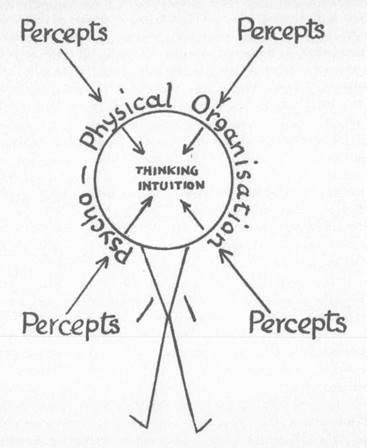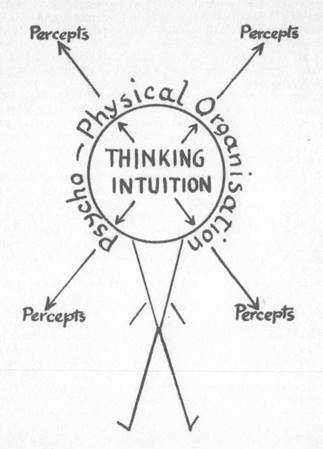|
“For the study of thinking, two things coincide which
elsewhere must always appear apart, viz. concept and percept.
If we fail to see this, we shall look upon the concepts which
we have elaborated in response to percepts as mere shadowy
copies of these percepts and we shall take the percepts as
presenting to us reality as it really is. We shall, further,
build up for ourselves a metaphysical world after the pattern
of the perceived world. We shall, each of us according to his
habitual thought-pictures, call this a world of atoms or of
will or of unconscious spirit, etc. And we shall fail to notice
that all the time we have done nothing but erect hypothetically
a metaphysical world modelled upon our perceived world. But if
we clearly apprehend what thinking consists in, we shall
recognise that percepts present to us only a portion of reality
and that the complementary portion (which alone imparts to
reality its full character as real), is experienced by us in
the permeation of percepts by thinking. We shall regard that
which enters into consciousness as thinking, not as some
shadowy copy of reality, but as a self-sustaining spiritual
essence. We shall be able to say of it that it is revealed to
us in consciousness through intuition. Intuition is the purely
spiritual conscious experience of a purely spiritual content.
It is only through intuition that we can grasp the essence of
thinking.
“Only if one wins through, by means of unprejudiced
observation, to the recognition of this truth of the intuitive
essence of thinking, will one succeed in clearing the way for a
conception of the psycho-physical organisation of man. One
recognises that this organisation can produce no effect
whatever on the essential nature of thinking. At first sight,
this seems to be contradicted by obvious facts. For ordinary
experience, human thinking occurs only in connection with and
by means of such an organisation. This dependence upon the
psycho-physical organisation is so patent that we can recognise
its true bearing only if we clearly appreciate that in the
essential nature of thinking it plays no part whatever. Once we
grasp this, we can no longer fail to notice how peculiar is the
relation of the human organisation to thinking. This
organisation contributes nothing to the essential nature of
thought but recedes whenever the thinking-activity appears. It
then suspends its own activity and yields ground. And the
ground thus set free is occupied by thinking. Thus, the essence
which is active in thinking has a two-fold function —
first, it restricts the human organisation in its own activity;
secondly, it steps into the place of it. Yes, even the former,
the restriction of the physical organisation, is an effect of
the activity of thinking and more particularly of that part of
the activity which prepares the manifestation of thinking. This
explains the sense in which thinking has its counterpart in the
organisation of the body. Once we perceive this, we can no
longer misapprehend what significance for thinking this
physical counterpart has. When we walk over soft ground, our
feet leave impressions in the soil. We do not believe that the
forces of the ground, from below, have formed these
foot-prints. We do not attribute to such forces any share in
the production of the foot-prints. Correspondingly, if without
prejudice we observe the essential nature of thinking, we shall
not attribute any share in it to the traces in the physical
organism which thinking produces in preparing its manifestation
through the body.”
We
are called upon here, very urgently indeed, for
“unprejudiced observation” of thinking. We must not
take it for granted — because the tendencies of this
particular phase of history run so tumultuously in that
direction — that thinking can be explained only as the
final product of physical-physiological processes. This hostile
prejudice may be latent in the student who feels himself
antipathetic to Dr. Steiner's line of thought. But the reader
who is sympathetic with Dr. Steiner's line of thought is likely
to be in a more unhopeful situation still. The danger is that
he will agree with what Dr. Steiner says, not because he has
observed it in himself, but because Dr. Steiner says it. ... We
are called upon to make, each of us, our own independent
observation of our own thinking. Unless we are able to be
completely objective, we render ourselves incapable of
listening to the argument, of effectively grasping it.
“But if we clearly apprehend what Thinking consists in,
we shall see that Percepts present to us only a portion of
reality and that the complementary portion — which alone
gives complete reality — is experienced by us in the
permeation of Percepts by Thinking.”
What do these words mean? Have we taken in what has been argued
in Part I of this book? Can we state to ourselves by what right
Dr. Steiner is able to make such an assertion?
As
apprehended by our senses, the world is mere appearance; it has
no true existence; it consists of meaningless particulars; it
is unintelligible. But as soon as we grasp it with our
thinking, we find it taking on meanings, values,
intelligibility, reality. This forces us to ask ourselves
— “If Thinking can effect such a transformation,
what sort of a thing is it?” We observe that Thinking,
like a king, confers relationships, establishes laws, groups
particulars into wholes, mediates the world-order. We note that
Thinking is not in any way derived from nor dependent upon
Percepts; we see that it completely transcends the perceptible;
we see that only in and through Thinking have Percepts come to
life. We realise that we are in the presence of a
“self-existing spiritual essence.”
“Thinking is revealed to us through intuition;”
“Only through intuition can we grasp the essence of
Thinking” ... All other items of experience are as if
“shot at us out of a gun;” they are felt as
externals. Thinking however we experience from within. What am
I to make of this plainly observable fact? I can give myself no
explanation of it except to say that whereas all other things
are in existence of themselves, my Thinking arises only
through and in me. The world of Percepts consists of
things that are not-me, of things un-me-ised;
Thinking is ME. America is there already in existence; so is
the sky; so is this table; so is my next door neighbour; but
not Thinking. If Thinking is to be in existence, I must bring
it into existence. “I think, therefore I am” really
signifies that Thinking is indissolubly one with my very
being.
Man
truly enough is part of nature. He is subject to natural
causation. His psycho-physical organisation mediates to him
external perceptual forces. Impelled by these, he is nothing
better than an animal, a plant, or a stone. “Our
dependence on the psychophysical organisation is obvious ...
but in the essential nature of Thinking it plays no part
whatever. It recedes whenever Thinking-activity appears; it
suspends its own activity; it yields ground. And the ground
thus set free is occupied by Thinking.”
We
are actors in a cosmic drama. When we think, we clear the stage
of perceptual rubbish so that this drama can go on. Thinking is
the power to create within ourselves a free space whereinto
physical forces are refused entry. As long as I am only a
sleeping, perceptualising creature, I am subject to natural
causation; when I awaken, when I become my Thinking Self, I
then become myself a cause.
To
me personally, observing myself, it seems beyond controversy
that by means of thinking, I can and do bring into existence
within myself a self-existing essence, wherein and wherefrom I
am no longer motivated by the external, the unknown, the
perceptual. … To prolong further the argument upon this
point would be unprofitable. The reader must forgive me if I
assume that the fact is established.
Within me is a source of spiritual activity. Whenever I choose,
I can ignore it; I can treat it as non-existent; I can let my
actions originate — through my psycho-physical
organisation — in the external-perceptual. I can let
myself be motivated openly or obscurely by the forces operative
in nature or in social conditions. I can allow the determinants
of my conduct to be such things as sex, fear, anger, the power
of the State, social convention, moral platitudes, obsolete
ideas, conscience. In so far as I let this kind of thing happen
to me, I am unfree: —

Alternatively, I can say “No” to the forces that
assail me from the external-perceptual and “Yes,”
to the intuitions that arise within me. I can refuse to let
myself be made into the plaything of obscure forces external to
my selfhood. I can, instead, in imaginativeness and in love, in
crystal-clear consciousness, creatively, give myself the
motives for what I do. This is to be “free.”

|